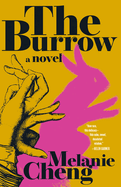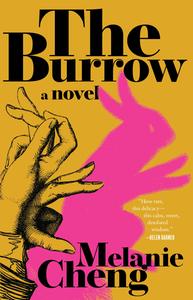
 Australian author and physician Melanie Cheng's third title, The Burrow, is an exquisite gem about a damaged family suffering in the aftermath of tragedy. Though her book is dominated by grief, Cheng is an expertly balanced storyteller, leavening the mourning with unexpected laughter, comforting cuddles, surprising grace, and the human need to win the love of grumpy (furry) creatures.
Australian author and physician Melanie Cheng's third title, The Burrow, is an exquisite gem about a damaged family suffering in the aftermath of tragedy. Though her book is dominated by grief, Cheng is an expertly balanced storyteller, leavening the mourning with unexpected laughter, comforting cuddles, surprising grace, and the human need to win the love of grumpy (furry) creatures.
Jin and Amy Lee, and their 10-year-old daughter, Lucie, live in metropolitan Melbourne. In the midst of Covid-19 pandemic shutdowns, emergency doctor Jin is an essential worker. He met Amy when they were both beginning their medical careers, but Amy has since become a published writer. She works from home, watching over Lucie, who continues her schooling online. Four years ago, the family was a quartet--until baby Ruby drowned at just six months old.
Despite the lockdown, the household is about to grow. First, there is the rabbit: "For sale: nine-week-old fawn-coloured male mini lop in search of his forever home." Jin and Amy "caved in to [Lucie's] pleading": "how could they even contemplate depriving the poor child of a pet, after everything she had endured?" One week later, Amy's estranged mother, Pauline, arrives with a broken wrist, sent by her medical team because she shouldn't be alone and the "hospital isn't exactly the safest place for an older person to be." At least the granny flat in the backyard is finished and Pauline can have a space of her own. Only Lucie seems to welcome her, introducing her to "this bunny with no name." Within minutes, he's named Fiver, inspired by one of Watership Down's heroes: Fiver is "a little bit magical," Pauline explains. The chosen moniker proves prescient: over the next few weeks, despite so much (more) hurting, the promise of healing begins to root and tentatively grow.
Cheng writes with superb, often wrenching, clarity: "she was in the habit of pretending"; "not caring was a kind of superpower"; "The extraordinary things about her were invisible--her memory, her vocabulary, her appetite for the macabre." In depicting the family that Jin Lee and Amy née Fitzgerald create, Cheng's own mixed-race Australian Chinese identity deftly reveals multicultural insights--about the number four (homophone for "death" in Mandarin), immigrant challenges, generational discomforts, the neither/nor of being in-between. As the lockdown slowly eases, alterations and adaptations are inevitable. Cheng empathically tracks a family finally learning to live with death. --Terry Hong
Shelf Talker: Melanie Cheng's exquisite novel about a grieving family is a superb balance of unexpected laughter, surprising grace, and the ubiquitous human need for furry love.

